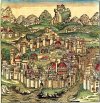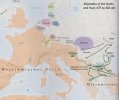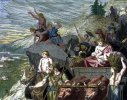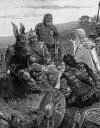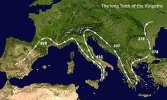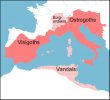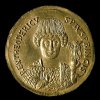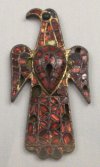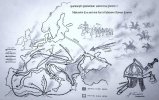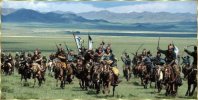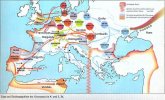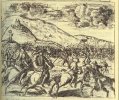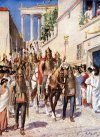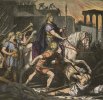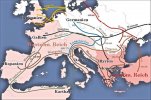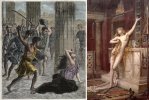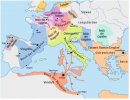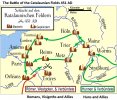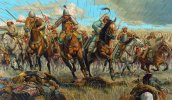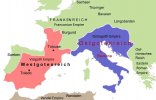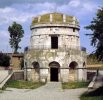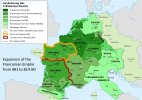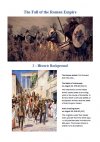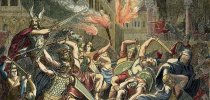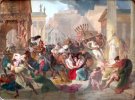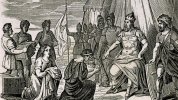Rupert_137
Governor
Looking back, the Goths are in need (3) – Teja's tits are supposed to be bleeding
I see the man standing in front of me with the whip. "Not from the front, not my bosom," I beg, but the guy just grins. He lifts his arm, reaches back and flings the thin but tough strap at me. The whip howls through the air...
Moments later, the leather tears across the tops of both of my delicate breasts. The blow makes my boobs shake and soaks them with fiery pain. I screech loudly, a burning red welt running above my tits. The audience is thrilled while I look at my boobs in horror.
"Give it to her, whip these gothic tits... beat her harder," someone calls out. Another is even meaner: "That was nothing; we want to see her naughty boobs bleed!"
"Eleven more ... Please not my breasts again," I think desperately. Then the man lifts the whip again, I hear the thong rush through the air ... this time the tough, thin leather shoots hissing diagonally across the front of my body ... from the shoulder over the left breast, where it crosses the first welt, further across my stomach down to my right hip.
I scream, howl and pant. I knew what to expect on this second blow and still I can't control myself. I jump up, the ropes pull me back and my breasts jump. People like that, but someone shouts: “Punish the Goth whore's tits harder, she must bleed!” “Yes, hit her harder, her tits should bleed!” Another man shouts.
It hurts so much, I'm scared and desperate. What have I done to these people? Why do they hate my boobs?
"Howl ... gossip!" The next blow, the next hit. This time the whip hits my right breast. The thong bites badly, my struck tit trembles, the pain is fiery. Again I gasp, clench my teeth and feel my first tears flow... Nine more to come!
His fourth blow from the front is mean and hits again my breasts, this time from the underside. The force makes my tits jump up as if released. The leather scrapes under my nipple on the left. It turns deep red and the pain is throbbing. The audience is happy, but not jet satisfied; more tears run down my cheeks.

Her tormentor aims the whip at Teja's breasts
The next blows follow and devastate my unprotected front, covering it with fiery welts, but the man with the whip is now slowly working his way deeper and deeper, over the ribs, several times over my stomach, down to the hips and the base of my thighs.
As the whip rages over my mons, it tears out a clump of pubic hair. The Romans are happy again and someone shouts: "Good thing, harvest the wool of her pussy with the whip!"
I sink into pain; my whole body is covered with red welts. "Ten…" the last two blows in the third and last sentence. But again the man stops and changes his whip. I haven't gotten through it yet.
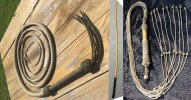
Cane and whips – Teja is severely punished for the fun of the Romans
My tormentor reaches for a significantly shorter strap. Then he comes very close to me. I have no doubt, he is now intent on punishing my breasts ... and people are demanding it. "Hit their boobs harder, her tits must bleed!" Another shouts: "Ruin her cheeky Goth tits!" I cannot and will not believe what I am hearing.
I want to beg that he will spare my breasts now; but when I hear the people shouting that he should strike my tits bloody, I just shake my head in fear.
My tormentor has a kind of riding whip in his hand, with a leather loop at the end of the elastic stick. He starts to play on my nipples until they stand up harder and harder. I just shake my head and go with fear. There is an excited, expectant silence in the audience. Suddenly the man reaches out and hits the end of the whip from top to bottom over the nipple of my left breast.
It's like lightning, I flinch; it hurts so much, I scream and howl. The spectators are enthusiastic, only a little later do I feel the reason. My warm blood is dripping from my teat. He gives me some time to collect myself; then he attacks the bud on my right breast.
"Aaaahhhhh … ouch … ow!" His blow jerks through me, robs me of the air to breathe, my legs become weak; I'm hanging on the ropes. But my nipple doesn't want to bleed; I see the disappointment in the eyes of my tormentor and feel it in the audience.
People ask for an encore. “No, not again!” I think, but the commander first points to my tormentor and then he shows three fingers. I am too eaten away by pain and fear; it wasn't until later that I should understand that the man had three attempts to make my nipples bleed if he didn't want to embarrass himself. The commandant hands my tormentor a thin stick with the words: "Show it the Goth girl that we don't tolerate thieves." The audience is enthusiastic.
The man in front of me starts to play with his stick on my nipples, repeatedly rubbing over the excited but injured buds until I moan in pain. Then he strikes, from above directly above my right bud. I can't breathe; the pain is cruel and even more intense than what I've experienced before... The little bud of my breast is cherry red and my blood is dripping from the nipple. The people applaud.
While I'm still panting and moaning in pain, he starts to play with my injured left nipple, which already hurts badly, but hardly bleeds anymore. Fearfully, I see the little bud straighten up even harder, and then he strikes. There is a flash of lightning and then a roar and raging. The blood is now dripping from both of my nipples. Finally, that was it what the audience wanted to see.
I took forty-one lashes. With the words "It's enough, she is bleeding" the commandant ends my punishment and the spectacle for the audience. My tormentor proudly points with his stick at the blood stains on the underside of my breasts, then he bows and there is stormy applause. I hang at the ropes for a while, the audience is allowed to gaze at me from all sides once more and admire the work of the man who made me suffer. I am no longer receptive to their certainly mean sayings in a foreign language.
They are finally untying me. I slump on my knees; I don't have the strength to stand. I hold one arm protectively over my breasts; the other hand goes between my legs. The guards grin, but I don't care now. Somebody throws at me my clothes and I start to get dressed again in front of the remaining spectators.

Teja is whipped until her tits bleed for the fun of the crowd

Teja after she was whipped
Three Roman soldiers pull me away from the crowd. "Hurry up girl, you need to get out of here now. Some of the men in the audience got a taste for you, they want even more from you... You gave us all an exciting performance... You are a really hot goth girl."
They are dragging me away, back to the commandant's house. My brother is waiting for me there. He has tears in his eyes when he sees me like this. He knows what I suffered for him, but I did it for both of us too. He will always owe me, and that is exactly what the Romans intend. They wanted to whip me, but humiliate both of us, yes and all the Goths who cannot protect their women...
"Your punishment was appropriate and a success for both sides," says the commander happily. "I'm sorry about the little encore, but people really liked you ... they wanted to see blood dripping from your tits ... Now they were having fun and after you screamed and pissed on yourself naked in front of them, they will no longer fear you and the Goths…” I felt ashamed by his remarks.
“Hopefully you Goths will stop stealing and earn your money honestly. In any case, the Goth girls in this city will earn well after you've been flogged... Many men will look for a blonde whore and in their minds they will fuck you instead of one of these girls."
Now I'm angry, but I'm silent; I'm too exhausted, my whole body burns like fire. I've suffered a lot more pain than I could ever have imagined. But I also feel deeply ashamed, for myself and for the people of the Goths. A naked, hungry Goth girl who is scared, screams in pain and is whipped until she bleeds from her back, bottom and breasts, is an attraction for the Romans ... so that they do not have to fear us. I will hate them forever ... and they should still fear us! I swear to myself I will never be humiliated by them again.
It was just a nice spectacle for the captain, I had to suffer seriously and bleed a little for my brother, which was appropriate and generous for him. At least he gives me back our sack with the stolen bread; he even put more bread in it. He also gives me figs. "So that you don't go hungry tonight," he says with a smile. He really seems to think I really deserved this meal today ... yes, he thinks he's a nice person! Sure, we could have been worse off than with this commander. My hatred is not for him, it is for the Romans.
When it gets dark, we sneak out of the city and only in the moonlight do we reach the gothic camp ... at least we brought bread for the whole family, very painfully earned bread, at least for me. I treat myself to figs for consolation.
My bottom is a place of sorrow and is covered with thick welts, I cannot sit. My whole back burns like fire, the skin is torn and I'm bleeding through my shirt. My front doesn't look much better, my nipples are no longer bleeding, but they too have dripped a blood stain on my shirt, they're swollen and they're still a long way from calming down. My skin is burning and my beautiful, tender breasts are throbbing, they are on fire ... even in my pussy I can still feel the leather thong bite.
Two women take care of me, they try to comfort me and to cool and heal my wounds with herbs and damp towels. I want to cry, but I suppress it. I want to be proud that I showed great courage and I was able to protect my brother from slavery.
Gillis listens attentively to my story the whole time without asking much. Then he said, “You are a strong woman and a brave warrioress. First you sacrificed yourself for your family so that they would have something to eat, then you suffered for your brother so that he could keep his hand and not become a slave ... and in the end you helped more than any other woman in defeating the Romans and killing Emperor Valens… You are a proud heroine of the Goths!” He takes me in his arms and kisses me. His hands slide slowly under my shirt and he feels my breasts.
"Are your boobs all right again?" Gillis asks worried. I first nod and then I laugh. But I remember my breasts have hurt a lot for a long time after my cruel and brutal punishment.
My suffering under the Romans as a whore and as a thief has not changed anything in his respect and affection for me. I feel relieved and happy despite my bad memories.
I see the man standing in front of me with the whip. "Not from the front, not my bosom," I beg, but the guy just grins. He lifts his arm, reaches back and flings the thin but tough strap at me. The whip howls through the air...
Moments later, the leather tears across the tops of both of my delicate breasts. The blow makes my boobs shake and soaks them with fiery pain. I screech loudly, a burning red welt running above my tits. The audience is thrilled while I look at my boobs in horror.
"Give it to her, whip these gothic tits... beat her harder," someone calls out. Another is even meaner: "That was nothing; we want to see her naughty boobs bleed!"
"Eleven more ... Please not my breasts again," I think desperately. Then the man lifts the whip again, I hear the thong rush through the air ... this time the tough, thin leather shoots hissing diagonally across the front of my body ... from the shoulder over the left breast, where it crosses the first welt, further across my stomach down to my right hip.
I scream, howl and pant. I knew what to expect on this second blow and still I can't control myself. I jump up, the ropes pull me back and my breasts jump. People like that, but someone shouts: “Punish the Goth whore's tits harder, she must bleed!” “Yes, hit her harder, her tits should bleed!” Another man shouts.
It hurts so much, I'm scared and desperate. What have I done to these people? Why do they hate my boobs?
"Howl ... gossip!" The next blow, the next hit. This time the whip hits my right breast. The thong bites badly, my struck tit trembles, the pain is fiery. Again I gasp, clench my teeth and feel my first tears flow... Nine more to come!
His fourth blow from the front is mean and hits again my breasts, this time from the underside. The force makes my tits jump up as if released. The leather scrapes under my nipple on the left. It turns deep red and the pain is throbbing. The audience is happy, but not jet satisfied; more tears run down my cheeks.

Her tormentor aims the whip at Teja's breasts
The next blows follow and devastate my unprotected front, covering it with fiery welts, but the man with the whip is now slowly working his way deeper and deeper, over the ribs, several times over my stomach, down to the hips and the base of my thighs.
As the whip rages over my mons, it tears out a clump of pubic hair. The Romans are happy again and someone shouts: "Good thing, harvest the wool of her pussy with the whip!"
I sink into pain; my whole body is covered with red welts. "Ten…" the last two blows in the third and last sentence. But again the man stops and changes his whip. I haven't gotten through it yet.

Cane and whips – Teja is severely punished for the fun of the Romans
My tormentor reaches for a significantly shorter strap. Then he comes very close to me. I have no doubt, he is now intent on punishing my breasts ... and people are demanding it. "Hit their boobs harder, her tits must bleed!" Another shouts: "Ruin her cheeky Goth tits!" I cannot and will not believe what I am hearing.
I want to beg that he will spare my breasts now; but when I hear the people shouting that he should strike my tits bloody, I just shake my head in fear.
My tormentor has a kind of riding whip in his hand, with a leather loop at the end of the elastic stick. He starts to play on my nipples until they stand up harder and harder. I just shake my head and go with fear. There is an excited, expectant silence in the audience. Suddenly the man reaches out and hits the end of the whip from top to bottom over the nipple of my left breast.
It's like lightning, I flinch; it hurts so much, I scream and howl. The spectators are enthusiastic, only a little later do I feel the reason. My warm blood is dripping from my teat. He gives me some time to collect myself; then he attacks the bud on my right breast.
"Aaaahhhhh … ouch … ow!" His blow jerks through me, robs me of the air to breathe, my legs become weak; I'm hanging on the ropes. But my nipple doesn't want to bleed; I see the disappointment in the eyes of my tormentor and feel it in the audience.
People ask for an encore. “No, not again!” I think, but the commander first points to my tormentor and then he shows three fingers. I am too eaten away by pain and fear; it wasn't until later that I should understand that the man had three attempts to make my nipples bleed if he didn't want to embarrass himself. The commandant hands my tormentor a thin stick with the words: "Show it the Goth girl that we don't tolerate thieves." The audience is enthusiastic.
The man in front of me starts to play with his stick on my nipples, repeatedly rubbing over the excited but injured buds until I moan in pain. Then he strikes, from above directly above my right bud. I can't breathe; the pain is cruel and even more intense than what I've experienced before... The little bud of my breast is cherry red and my blood is dripping from the nipple. The people applaud.
While I'm still panting and moaning in pain, he starts to play with my injured left nipple, which already hurts badly, but hardly bleeds anymore. Fearfully, I see the little bud straighten up even harder, and then he strikes. There is a flash of lightning and then a roar and raging. The blood is now dripping from both of my nipples. Finally, that was it what the audience wanted to see.
I took forty-one lashes. With the words "It's enough, she is bleeding" the commandant ends my punishment and the spectacle for the audience. My tormentor proudly points with his stick at the blood stains on the underside of my breasts, then he bows and there is stormy applause. I hang at the ropes for a while, the audience is allowed to gaze at me from all sides once more and admire the work of the man who made me suffer. I am no longer receptive to their certainly mean sayings in a foreign language.
They are finally untying me. I slump on my knees; I don't have the strength to stand. I hold one arm protectively over my breasts; the other hand goes between my legs. The guards grin, but I don't care now. Somebody throws at me my clothes and I start to get dressed again in front of the remaining spectators.

Teja is whipped until her tits bleed for the fun of the crowd

Teja after she was whipped
Three Roman soldiers pull me away from the crowd. "Hurry up girl, you need to get out of here now. Some of the men in the audience got a taste for you, they want even more from you... You gave us all an exciting performance... You are a really hot goth girl."
They are dragging me away, back to the commandant's house. My brother is waiting for me there. He has tears in his eyes when he sees me like this. He knows what I suffered for him, but I did it for both of us too. He will always owe me, and that is exactly what the Romans intend. They wanted to whip me, but humiliate both of us, yes and all the Goths who cannot protect their women...
"Your punishment was appropriate and a success for both sides," says the commander happily. "I'm sorry about the little encore, but people really liked you ... they wanted to see blood dripping from your tits ... Now they were having fun and after you screamed and pissed on yourself naked in front of them, they will no longer fear you and the Goths…” I felt ashamed by his remarks.
“Hopefully you Goths will stop stealing and earn your money honestly. In any case, the Goth girls in this city will earn well after you've been flogged... Many men will look for a blonde whore and in their minds they will fuck you instead of one of these girls."
Now I'm angry, but I'm silent; I'm too exhausted, my whole body burns like fire. I've suffered a lot more pain than I could ever have imagined. But I also feel deeply ashamed, for myself and for the people of the Goths. A naked, hungry Goth girl who is scared, screams in pain and is whipped until she bleeds from her back, bottom and breasts, is an attraction for the Romans ... so that they do not have to fear us. I will hate them forever ... and they should still fear us! I swear to myself I will never be humiliated by them again.
It was just a nice spectacle for the captain, I had to suffer seriously and bleed a little for my brother, which was appropriate and generous for him. At least he gives me back our sack with the stolen bread; he even put more bread in it. He also gives me figs. "So that you don't go hungry tonight," he says with a smile. He really seems to think I really deserved this meal today ... yes, he thinks he's a nice person! Sure, we could have been worse off than with this commander. My hatred is not for him, it is for the Romans.
When it gets dark, we sneak out of the city and only in the moonlight do we reach the gothic camp ... at least we brought bread for the whole family, very painfully earned bread, at least for me. I treat myself to figs for consolation.
My bottom is a place of sorrow and is covered with thick welts, I cannot sit. My whole back burns like fire, the skin is torn and I'm bleeding through my shirt. My front doesn't look much better, my nipples are no longer bleeding, but they too have dripped a blood stain on my shirt, they're swollen and they're still a long way from calming down. My skin is burning and my beautiful, tender breasts are throbbing, they are on fire ... even in my pussy I can still feel the leather thong bite.
Two women take care of me, they try to comfort me and to cool and heal my wounds with herbs and damp towels. I want to cry, but I suppress it. I want to be proud that I showed great courage and I was able to protect my brother from slavery.
Gillis listens attentively to my story the whole time without asking much. Then he said, “You are a strong woman and a brave warrioress. First you sacrificed yourself for your family so that they would have something to eat, then you suffered for your brother so that he could keep his hand and not become a slave ... and in the end you helped more than any other woman in defeating the Romans and killing Emperor Valens… You are a proud heroine of the Goths!” He takes me in his arms and kisses me. His hands slide slowly under my shirt and he feels my breasts.
"Are your boobs all right again?" Gillis asks worried. I first nod and then I laugh. But I remember my breasts have hurt a lot for a long time after my cruel and brutal punishment.
My suffering under the Romans as a whore and as a thief has not changed anything in his respect and affection for me. I feel relieved and happy despite my bad memories.



